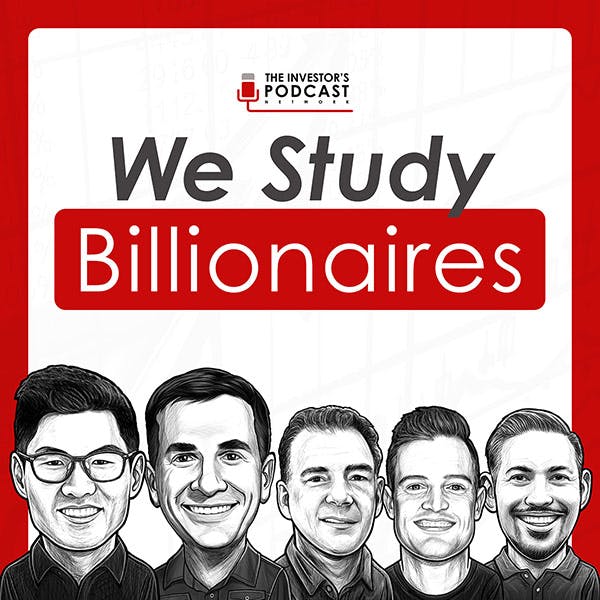
May 17, 2024 • 54min
TIP631: The Bullish Energy Cycle w/ Arvind Sanger
We Study Billionaires - The Investor’s Podcast Network

Key Takeaways
- Energy markets are inherently cyclical due to long lead times for supply to come online and come offline. The current cycle is unique due to underinvestment in fossil fuel supply.
- A sensible energy transition needs to recognize limitations of clean energy sources and that fossil fuels can't be eliminated overnight. Banning fossil fuel investment only constrains supply, not demand.
- China and India continue to play major roles in energy markets. China dominates green tech supply chains while India's growing infrastructure needs are driving demand.
- AI and data centers are dramatically increasing electricity demand, potentially quadrupling from 2% to 8% of global electricity use by 2030.
- Key metals for the energy transition include steel, copper, and uranium. Supply constraints exist for many of these critical materials.
- Nuclear power is seen as a promising baseload clean energy source, with small modular reactors offering potential advantages.
- Metallurgical coal remains critical for steel production in developing economies building out infrastructure.
- Potential breakthrough technologies to watch include improved battery storage and nuclear fusion, though timelines are uncertain.
Introduction
In this episode, host Clay Finck interviews Arvind Sanger, founder and managing partner of Geosphere Capital Management. Arvind has over 30 years of experience analyzing and investing in the energy sector. The discussion covers Arvind's outlook on the current energy cycle, investment opportunities in energy and metals, and the challenges of the energy transition.
Topics Discussed
Evolution of Energy Markets (2:44)
Arvind provides an overview of how energy markets have evolved over his 30+ year career:
- 1980s-1990s saw mini-cycles with periods of oversupply
- 2000s brought sustained growth driven by China's emergence and peak oil fears
- 2010s characterized by shale oil boom creating oversupply
- Current cycle defined by energy transition and supply constraints
He notes that "Every cycle is different, but there are echoes of previous cycles in every cycle."
Cyclicality of Energy Markets (6:22)
Arvind explains why energy markets tend to be highly cyclical:
- Supply side drives deeper, longer-lasting cycles due to long lead times
- Oversupply often peaks just as demand growth slows
- Current cycle unique due to underinvestment in fossil fuel supply
- Fear of stranded assets due to energy transition limiting long-term projects
He states: "What makes this cycle different is this fear about energy transition, which in my opinion is keeping supply's not my opinion, but everybody knows it's keeping a lid on supply in a way that I haven't seen before."
Sensible Energy Transition (11:58)
Arvind advocates for a pragmatic approach to energy transition:
- Recognize limitations of clean energy sources
- Acknowledge fossil fuels can't be eliminated overnight
- Consider needs of developing economies for affordable energy
- Account for rising energy demand from AI/data centers
He argues: "The dumb energy transition is that if we stop investing in fossil fuels we will save the environment. The reality is by stopping investing in fossil fuels, you're not impacting demand, you're impacting supply."
China and India's Role in Energy Markets (21:20)
Discussion of how China and India are shaping energy markets:
- China transitioning from demand driver to supply dominator in green tech
- China controls 70%+ of solar modules, lithium processing
- India becoming more important demand driver going forward
- India's steel demand growing at double digits as infrastructure expands
Arvind notes: "India will always be two steps behind the curve, but it's still on a path where I think that for the rest of this decade, it's going to be the biggest factor in terms of incremental demand for a lot of energy and related resources."
AI and Data Centers Impact on Energy Demand (27:35)
Arvind highlights the growing energy demands from AI and data centers:
- Data centers + crypto mining currently ~2% of global electricity demand
- Projected to grow to 4% by 2026 and 8% by 2030
- AI applications like ChatGPT far more energy intensive than traditional computing
- Electrification of vehicles adding further demand pressure
He states: "So far, the demand estimates that people have made have proved to be too low. Let's see if these demand estimates prove to be too high. I doubt it."
Key Metals for Energy Transition (32:10)
Arvind discusses critical metals needed for clean energy technologies:
- Steel - needed across all clean tech (wind, solar, etc.)
- Copper - essential for electrification and batteries
- Uranium - required for nuclear power expansion
He notes significant supply challenges: "The amount of copper we that people have estimated for energy transition over the next 20 years we need is more copper than we found in human history."
Nuclear Power Outlook (38:21)
Discussion of nuclear power's role in clean energy transition:
- Lowest CO2 emissions per unit of power of any source
- Small modular reactors (SMRs) offer safety and deployment advantages
- US, Europe, Japan announced plans to triple nuclear capacity by 2040
- Supply chain challenges with uranium processing reliance on Russia
Arvind states: "There is no pure green. So each one has its own, you know, side effects, if you will. And nuclear has its own, but I think those are very manageable."
Metallurgical Coal (48:15)
Arvind explains the importance of metallurgical coal:
- Highest quality coal used in steel production
- Critical for developing economies building infrastructure
- Limited new supply coming online due to ESG concerns
- Developing economies lack scrap steel for electric arc furnaces
He notes: "The reality is that this is a key commodity without which steel you make steel two major ways. You make steel in an electric arc furnace where you use electric arc with cheap electricity and use scrap steel...In a developing economy, where you have small infrastructure build and you're building out much more, you don't have enough scrap steel to be able to provide enough steel for growth."
Key Data Points to Watch (51:10)
Arvind highlights important trends he's monitoring:
- Shift from pure electric to hybrid vehicles
- China's real estate market struggles impacting metals demand
- US and European economic growth
- Supply data for oil, gas, uranium
Potential Breakthrough Technologies (54:13)
Discussion of technologies that could disrupt energy markets:
- Improved battery storage for renewables
- Nuclear fusion (long-term potential)
- Enhanced copper exploration/refining techniques
Arvind cautions: "I couldn't have answered this question with any intelligent answer back in 2007-8 in terms of shale, I had no idea that was coming. So when I think about it, there are always going to be surprises."
Conclusion
The discussion with Arvind Sanger provides a comprehensive overview of the current state of energy markets and the challenges of the energy transition. Key themes include the cyclical nature of energy markets, the need for a pragmatic approach to energy transition, and the critical role of metals and minerals in enabling clean energy technologies. Arvind emphasizes the importance of considering both supply and demand factors, as well as the needs of developing economies, in formulating energy policies. While he sees significant investment opportunities in areas like uranium, offshore energy, and metallurgical coal due to supply constraints, he also acknowledges the potential for disruptive technologies to emerge unexpectedly.









